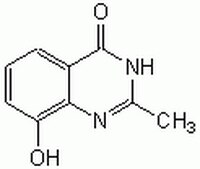493800 Sigma-AldrichPARP Inhibitor VI, NU1025 - CAS 90417-38-2 - Calbiochem
The PARP Inhibitor VI, NU1025, also referenced under CAS 90417-38-2, controls the biological activity of PARP. This small molecule/inhibitor is primarily used for Cell Structure applications.
More>> The PARP Inhibitor VI, NU1025, also referenced under CAS 90417-38-2, controls the biological activity of PARP. This small molecule/inhibitor is primarily used for Cell Structure applications. Less<<Synonyms: 8-Hydroxy-2-methylquinazoline-4-one
Recommended Products
Overview
| Replacement Information |
|---|
Key Specifications Table
| CAS # | Empirical Formula |
|---|---|
| 90417-38-2 | C₉H₈N₂O₂ |
Products
| Catalog Number | Packaging | Qty/Pack | |
|---|---|---|---|
| 493800-5MG | Plastic ampoule | 5 mg |
| Product Information | |
|---|---|
| CAS number | 90417-38-2 |
| ATP Competitive | N |
| Form | Off-white solid |
| Hill Formula | C₉H₈N₂O₂ |
| Chemical formula | C₉H₈N₂O₂ |
| Reversible | N |
| Structure formula Image | |
| Quality Level | MQ100 |
| Applications |
|---|
| Biological Information | |
|---|---|
| Primary Target | PARP |
| Primary Target IC<sub>50</sub> | 0.4 µM against poly(ADP-ribose) polymerase (PARP) |
| Purity | ≥98% by HPLC |
| Physicochemical Information | |
|---|---|
| Cell permeable | N |
| Dimensions |
|---|
| Materials Information |
|---|
| Toxicological Information |
|---|
| Safety Information according to GHS |
|---|
| Safety Information |
|---|
| Product Usage Statements |
|---|
| Packaging Information | |
|---|---|
| Packaged under inert gas | Packaged under inert gas |
| Transport Information |
|---|
| Supplemental Information |
|---|
| Specifications |
|---|
| Global Trade Item Number | |
|---|---|
| Catalog Number | GTIN |
| 493800-5MG | 04055977272826 |
Documentation
PARP Inhibitor VI, NU1025 - CAS 90417-38-2 - Calbiochem SDS
| Title |
|---|
PARP Inhibitor VI, NU1025 - CAS 90417-38-2 - Calbiochem Certificates of Analysis
| Title | Lot Number |
|---|---|
| 493800 |
References
| Reference overview |
|---|
| Delaney, C.A., et al. 2000. Clin. Cancer Res. 6, 2860. Boulton, S., et al. 1999. Carcinogenesis 20, 199. Bowman, K.J., et al. 1998. Br. J. Cancer 78, 1269. Griffin, R.J., et al. 1998. J. Med. Chem. 41, 5247. Griffin, R.J., et al. 1996. Pharm. Sci. 2, 43. Boulton, S., et al. 1995. Br. J. Cancer 72, 849. Griffin, R.J., et al. 1995. Anticancer Drug Res. 10, 507. |







